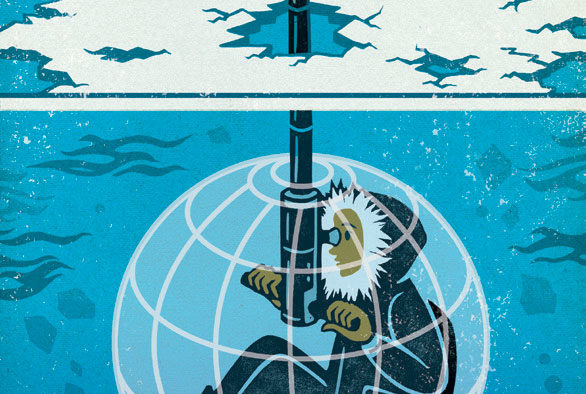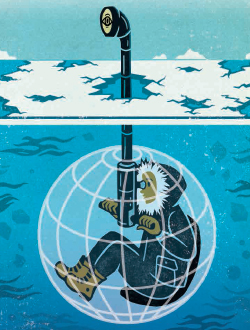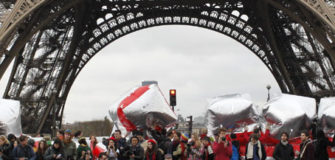“In 2020, Canadian foreign policy will be…

David Black
…considerably more sociable – more broadly engaged and engaging, less choosy and judgemental in the non-governmental, bilateral and multilateral company that it keeps. It will be more complete, with greater emphasis on the complementarities between different forms of international engagement and a less relentless emphasis on the twin anchors of security and prosperity. It will, in other words, rediscover the attractions of ‘soft power’ – whether or not it chooses to use this language.
More concretely, it will have renewed the Canadian proclivity to work with and within the various agencies of the UN system and other manifestations of inclusive multilateralism; to support UN peacekeeping (albeit with limited and specialized resources); to support cultural diplomacy and educational exchanges; and, perhaps most conspicuously, to engage in ‘green diplomacy.’
Yet underlying these changes in tone and activity will be powerful continuities, reinforced by Canada’s increasing sense of vulnerability within a troubled global economy and community. As the new government’s resistance to transparency on the sale of light armoured vehicles to Saudi Arabia indicates, it will struggle to balance commercial and human rights imperatives, characteristically tipping toward the former. It will pursue bilateral and multilateral trade liberalization with zeal comparable to that of its predecessors. Especially in the shadow of a prolonged commodities bust, it will resist calls for more robust requirements for transparency and accountability by Canadian extractive companies operating in remote regions of the developing world. And it will struggle to set and meet its admittedly elevated aspirations toward meaningful action on climate change.
Activist aspirations and expectations will continue to be undermined by inadequate commitments of intellectual, bureaucratic and material resources, as well as by the chronic difficulty of sustaining a depth of interest in a manageable set of key priorities.
Moreover, if the previous Conservative government had a tendency to use foreign policy to posture for selective international and domestic audiences – thereby signalling its disinterest in the difficult work of global problem-solving – Canada’s new foreign policy will be vulnerable to a different (yet familiar) type of posturing. Activist aspirations and expectations will continue to be undermined by inadequate commitments of intellectual, bureaucratic and material resources, as well as by the chronic difficulty of sustaining a depth of interest in a manageable set of key priorities. The development, military and diplomatic capacities required to buttress an activist foreign policy will not be renewed with sufficient speed or volume to significantly narrow the gap between expectations and performance – particularly while the domestic economy remains anaemic. And, while much of the world has eagerly welcomed Canada ‘back’ to the diverse domains of international relations, it will take time and effort to rebuild the trust, knowledge and relationships on which previous Canadian diplomatic successes have rested.
Taken together, changes to the practice of Canadian foreign policy will fall short of the promise generated in the heady early days of the new government. Yet this persistent – at times yawning – gap between expectation and performance still represents a meaningful advance on a foreign policy that is immune to aspiration, and therefore to the pressures of accountability that come with it.”
» David Black is Lester B. Pearson Professor of International Development Studies in the Department of Political Science at Dalhousie University in Halifax.
Elinor Sloan
…responding to many challenges to Canadian security, including great power tension, threats to the Arctic, the intersection of weapons of mass destruction and radicalism, and failed states and terrorism.
The prospect of great power war will increase. Russia’s actions in Crimea and southeastern Ukraine are compounded by increased air patrols close to NATO territory, military doctrine identifying NATO as a threat, and new military capabilities for scenarios against the West. China, for its part, is increasingly assertive, threatening and harassing its neighbours in the South China Sea and building artificial islands – thereby challenging America’s regional dominance with a naval force buildup, and aggressively pursuing cyber capabilities.
Great power interests are intersecting in the melting Arctic. To control the Northern Sea Route, Russia is establishing a network of Arctic naval bases and permanently basing ground forces there. Its new naval doctrine, buttressed by new ships and submarines, proclaims the region to be a top priority. China’s leadership sees the Arctic as a critical time-saving shipping route to Europe – key to the economic growth that it needs to maintain its hold on power. It is seeking an Arctic shipping hub, has one Polar Class icebreaker regularly traversing the Arctic, and is building a second.
Radicalism and weapons of mass destruction pose a potential existential threat. Pakistan, a nuclear-armed country with an unstable government facing dangerous unrest, is developing tactical nuclear weapons that could fall into the hands of extremists. Failed states continue to provide the space for international terrorism to take hold. While it will likely be defeated by 2020, ISIS will leave in its wake ongoing sectarian violence not unlike the Balkan wars of the 1990s.
These percolating and boiling-over threats to Canada and its allies will be fully manifest by 2020. Militarily, Canada will undertake measures to help contain the Russian threat to Eastern Europe, such as the deployment of fighter aircraft and a small number of ground forces to demonstrate solidarity. Its modernized class of frigates will sail with the US navy in the Pacific. The first of its Arctic Offshore Patrol Ships will deploy to the north, a satellite surveillance project will be a priority, and search and rescue aircraft will be ‘fast-tracked’ to address increased northern activity. An international peacekeeping force, to which Canada would contribute communications, intelligence and perhaps a battalion group, will deploy to the Syria/Iraq region to patrol buffer zones between sectarian groups.
Diplomatically, Canada will, among other things, be engaged with Russia bilaterally and multilaterally through NATO; work bilaterally with China and the US and will seek entry to the ASEAN Defence Ministers’ Meeting-Plus; engage ever more closely with America to address Arctic threats, putting aside differences over the Northwest Passage; promote the security of nuclear weapons in Pakistan through diplomacy as well as electronic and human intelligence; and assist in bringing about Dayton-like accords in the Middle East as a means of beginning the process of building regional stability.”
» Elinor Sloan is Professor of International Relations at Carleton University in Ottawa. Her most recent book is Modern Military Strategy (Routledge, 2012).
Thomas Juneau
…au Moyen-Orient sera, dans ses grandes lignes, très semblable à ce que nous voyons aujourd’hui, et très semblable à ce que nous avons vu au cours des dernières années. Il y aura certainement de légères modifications: la rhétorique entourant les actions du Canada, notamment, évoluera au fil des événements dans la région et au pays.
Les grandes orientations, néanmoins, varieront peu. Le Canada maintiendra des relations cordiales avec la majorité des pays de la région. Ces relations seront positives, mais limitées: les échanges commerciaux demeureront marginaux pour le Canada – et pour les pays de la région – alors que les visites de haut niveau demeureront rares. Le gouvernement affirmera, comme il le fait depuis des années, que la diversification et l’intensification de ses relations commerciales dans la région représente une priorité importante. Ottawa ne réussira pas, par contre, à réaliser cet objectif de manière soutenue. Tout comme aujourd’hui, le débat public entourant la politique du Canada au Moyen-Orient sera largement déconnecté des événements dans la région, dans la mesure où partis politiques et médias continueront à mettre de l’avant deux approches prétendument opposées: pour la gauche, une vision idéalisée – mais invraisemblable – d’un Canada jouant un rôle de médiateur et de vecteur de paix, contre, à droite, la vision d’un Canada mettant de l’avant une politique basée sur des principes nobles – même si, en pratique, l’application de ces principes ne peut qu’être sélective et partielle.
En réalité, les actions du Canada dans la région demeureront dictées non pas par nos idéaux ou nos valeurs, mais d’abord et avant tout par deux variables: la perception qu’Ottawa aura des attentes de nos alliés – principalement les États-Unis – ainsi que par les événements dans la région. En effet, les actions du Canada seront encore, comme aujourd’hui, réactives, et non pas guidées par un cadre stratégique cohérent. Malgré ses promesses et sa bonne volonté, le Canada continuera à investir relativement peu de ressources tangibles – diplomatiques, militaires et commerciales – dans la région, et donc ne parviendra pas à augmenter son influence qui, aujourd’hui, est très limitée».
» Thomas Juneau est professeur adjoint à l’École supérieure d’affaires publiques et internationales, Université d’Ottawa. Il est l’auteur de Squandered Opportunity: Neoclassical Realism and Iranian Foreign Policy (Stanford University Press, 2015).
Adam Chapnick
…likely to look a lot like it did in 2015, which was a lot like it did in 2006, in 1993, in 1984, and so on.
Canada is a moderate global power with an open economy that benefits from a stable, peaceful, rules-based international system. As a relatively small, but still active and contributing member of the G7, the G20, NATO, the OECD, the Commonwealth, la Francophonie, the OAS, and so many other multilateral organizations and alliances, it has the capacity to make the occasional difference in world affairs – be it helpful or harmful – and a sense of global self-importance that vastly exceeds its actual historical contributions.
The Conservatives under Prime Minister Harper, much like their Liberal and Progressive Conservative predecessors, attempted to impose significant changes to Canadians’ understanding of their country’s place in the world. As Roland Paris showed in a recent article in International Journal, however, they were largely unsuccessful. Indeed, real change in Canadian foreign policy – change with long-term strategic implications in the global commons – is much harder to come by, and much more expensive.
A recent study by Robert Greenhill and Megan McQuillan for Opencanada.org notes that Canadian spending on defence and development assistance as a percentage of gross national product – what Greenhill and McQuillan call global engagement – is now “the lowest in the G7 (alongside Japan), the lowest among medium-sized open economies and, according to OECD and NATO statistics, the lowest in modern Canadian history.” Add to that a population that is less than 1/30th the size of China’s, and an economy less than 1/10th the size of that of the US, and there are real limits to what Canada’s foreign policy can legitimately be expected to achieve.
As we enter 2016, the Canadian economy is struggling, and there is little reason to believe that the Trudeau government will make the massive increases (Greenhill and McQuillan suggest 50 to 125 percent of current spending) to the global affairs budget necessary to effect significant change abroad. Over the next five years, therefore, there will continue to be room for niche initiatives, like the commitment of Trudeau’s predecessor to maternal, newborn and child health, but – barring significant, unanticipated economic growth or a cataclysmic security failure – not much more.
All of this is not to say that Canadians should abandon any pretensions to activism on the world stage. As a prosperous country that has flourished in the system of global governance built around the UN, Canada has both a vested interest and a moral obligation to support the UN system along with those countries and people who have been less fortunate.
Let us not kid ourselves, however, about how much Canadian foreign policy can do on its own. Indeed, if the Trudeau government manages to improve just the tone of Canada’s global posture, and if it does not cut into Ottawa’s meagre international capabilities any further than have its recent predecessors (Liberal and Conservative alike), then Canadians, and indeed non-Canadians around the world, will have reason to cheer.”
» Adam Chapnick is the deputy director of education at the Canadian Forces College and a professor of defence studies at the Royal Military College of Canada.












